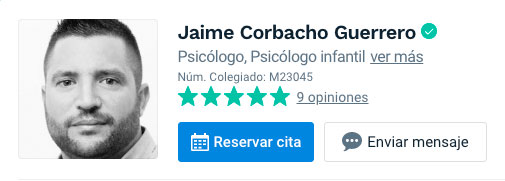Normally we tend to think erratically that children's problems will be magically solved when they grow up, that despite what it may seem they are not important. Nothing could be further from the truth. unresolved problems at an early age will stay with you all your life. It is clinically proven that problems in children can manifest themselves in adulthood.
For this reason, when we observe abnormal behaviors for his ageThe following may be the result of excessive shyness or unusual disinterest in his surroundings, violent behavior (excessive anger, intense or frequent tantrums, systematic disobedience, etc.), or an exacerbated fear of being alone. it is advisable to consult a specialist. The child and adolescent psychologist will provide us with tools, skills and concrete guidelines to face the problem.
Sometimes, even in the case of very young children, it is not necessary for the child to see a psychologist.. Depending on the case, only a few orientation sessions for parents may be necessary to change habits and modify undesirable behaviors in the child.
In any case, although proper communication between parents and children is paramount.However, there are cases in which it may not be enough to solve certain problems. It is in these situations when it is advisable to go to the child and adolescent psychologist with the child, approaching the issue naturally and without hiding the purpose of the visit. If the children are young, it can be approached as a game in which the parents and the therapist will play with them.
Most common psychological problems in childhood.
Childhood anxiety appears when children feel that the experience they are going through at a given moment is beyond them, with no clear or relatively easy solution to deal with. When this happens they usually perceive certain stimuli as threats that generate intense fear. These threats may be real or perceived only by the child.
Some of the most distinctive signs of childhood anxiety are excessive worrying, physical complaints such as loss of appetite or headache, and hyperactivity and restlessness in daily activities.
What are the most common symptoms of anxiety in children?
Anxiety is a state of agitated mood.A child's anxiety is a disturbance, an anguish that a child cannot control and that ends up affecting his or her behavior. A child with anxiety may 'shut himself up' in his world and refuse to communicate or, on the contrary, explode in a whirlwind of anger (through a tantrum or aggressive behavior).
The most imaginative children, those who tend to exaggerate things, children who are permanently on alert, defensive and those who have problems controlling their emotions, are more prone to suffer from anxiety. These are the most common symptoms of anxiety in children:
- Tachycardia, nervousness.
- Difficulty breathing.
- Excessive sweating.
- Dizziness.
- Muscle tension.
- Stomach pain.
- Excessive preoccupation.
- Self-esteem problems.
- Difficulty concentrating.
- Negative thoughts.
- Hunger attacks.
- Nervous tics.
- Excessive sensitivity.
- Repetitive movements.
- Phobias or intense fear.
Childhood depression is a mood disorder accompanied by dysfunctional behaviors that can affect boys and girls alike. When prolonged over time can interfere in different areas of your life. It is estimated that approximately 5% of children and adolescents will have a depressive episode before their 19th birthday.
Symptoms of childhood depression may include elevated irritability, extreme anger or hostility, frequent sadness or crying spells, feelings of hopelessness, decreased interest in activities, persistent boredom, lack of energy or tiredness, social isolation or lack of communication, low self-esteem or feelings of guilt, and extreme sensitivity to rejection.
Treatments for childhood depression are based on a combination of psychotherapy and medication.. Psychotherapy can help the child express emotions, improve self-esteem, and develop coping skills. Medication can relieve symptoms of depression and regulate mood. The type and dosage of medication should be adjusted according to each patient's needs and response.
It is important for parents or caregivers to be involved in the treatment of childhood depression.. They can offer support, understanding and affection to the child, as well as collaborate with the therapeutic team and follow their directions. They may also benefit from guidance and advice on how to handle the situation.
Childhood depression is a serious condition that requires professional attention. If you suspect that your son or daughter may be suffering from depression, do not hesitate to consult us. The sooner treatment is started, the better the chances of recovery and prevention of future complications.
- Disobedience,
- Tantrums.
- Lies.
- Theft.
- Fights
- Lack of empathy.
- Feelings of guilt.
Behavioral problems can have several causessuch as biological, family, school or environmental factors. To treat them, it is important to consult with a professional who can evaluate the case and offer an appropriate intervention plan. Some strategies that can help are: establish clear rules and boundaries, reinforce positive behaviors, ignore negative behaviors when possible, teach social and emotional skills, and provide support and affection to the child.
- Difficulty in falling or staying asleep.
- Excessive daytime sleepiness.
- Irritability, anxiety or depression.
- Attention, memory or learning problems.
- Mood, behavioral or social disturbances.
- Low school or work performance.
To treat sleep problems in children it is important to consult a specialist who can make a proper diagnosis and rule out possible medical or psychological causes. In addition, it is recommended to follow a series of hygienic sleep measures to promote a good night's rest.such as:
- Establish a regular and relaxing bedtime routine.
- Avoid screens, caffeine and heavy meals before bedtime.
- Maintain a dark, quiet and comfortable environment in the bedroom.
- Respect sleep schedules and sleep needs according to the child's age.
- Encourage healthy eating habits, exercise and exposure to natural light.
Sleep problems in children are common and can have negative consequences for their health and well-being. That is why, it is important to detect and treat them in time with the help of a professional and following appropriate guidelines to improve the quality and quantity of children's sleep.
Other recommendations and specific programs.
We have all heard or said at some point that "children are like sponges" in reference to their ability to learn, and it is true, but it is also true that we must help them develop all their abilities and better understand the world around them. As a well-known tire advertisement used to say ─ power without control is useless─, moreover, it can be detrimental.
The brain of a child up to 6 years of age is more receptive and can adapt and reorganize its functions with great ductility. This is an advantage that the Early Attentionwhich can be applied from birth to 6 years of age. There are two types of early care: therapeutic, when the child presents a problem in its development, and preventive, when the child, in spite of being developing correctly at the moment, presents signs of risk of suffering some disorder in the short or medium term.
Early attention favors the development of children under 6 years of age by helping them to develop their emotional intelligence, improve their motor functions and learn to interact with others. So, if they present some kind of problem in their development they can improve a lot, and in many cases even be completely solved, as long as action is taken quickly. The earlier they receive early care, whether preventive or therapeutic, the better the results will be. If it is possible to receive early care as soon as they are born, it is better than waiting until they are one year old.
Other specific programs that we offer at Psicología Corbacho oriented to child and adolescent psychology are:
- Study techniques.
- Intelligence assessment.
- High capabilities.
- Counseling to parents.
From our therapeutic center we encourage you to ask us for help, the child psychologist can provide strategies and tools appropriate to the needs of your son or daughter and yours and those of your family to overcome the difficulties that always occur in the normal development of children and adolescents.




